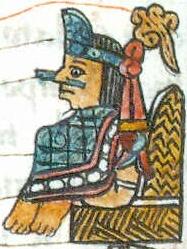Moctezuma II
Moctezuma II, also known as Montezuma II, was the ninth Huey Tlatoani or ruler of the Aztec Empire, reigning from 1502 until his death in 1520. He is best known for his encounter with the Spanish conquistador Hernán Cortés, which ultimately led to the downfall of the Aztec Empire.
Early Life[edit | edit source]
Moctezuma II was born in 1466 in Tenochtitlan, the capital of the Aztec Empire. He was the son of Axayacatl, the sixth Huey Tlatoani, and a member of the royal family. Moctezuma was educated in the traditional Aztec manner, learning about religion, warfare, and governance.
Ascension to Power[edit | edit source]
In 1502, Moctezuma II ascended to the throne following the death of his uncle, Ahuitzotl. His reign was marked by a consolidation of power and expansion of the empire. Moctezuma II was known for his autocratic style of rule, centralizing authority and expanding the empire's influence through military campaigns.
Encounter with the Spanish[edit | edit source]
In 1519, Moctezuma II received news of the arrival of Spanish explorers led by Hernán Cortés. Initially, he believed Cortés to be the god Quetzalcoatl, whose return was prophesied in Aztec mythology. Moctezuma sent emissaries with gifts to the Spanish, hoping to appease them.
Cortés and his men eventually reached Tenochtitlan, where Moctezuma welcomed them into the city. However, tensions soon arose, and Moctezuma was taken hostage by the Spanish. During his captivity, Moctezuma attempted to maintain peace between the Aztecs and the Spanish, but his authority was undermined.
Death and Legacy[edit | edit source]
Moctezuma II died on June 29, 1520, under unclear circumstances. Some accounts suggest he was killed by the Spanish, while others claim he was stoned by his own people for his perceived betrayal. His death marked a turning point in the Spanish conquest of the Aztec Empire.
Moctezuma II's legacy is complex. He is often portrayed as a tragic figure, caught between the demands of his people and the overwhelming force of the Spanish invaders. His reign is remembered for both the height of Aztec power and the beginning of its decline.
Also see[edit | edit source]
 |
| Rulers (tlahtoqueh) of Tenochtitlan |
|---|
| Rulers subject to Azcapotzalco |
| Acamapichtli (1375–1395) |
| Huitzilihhuitl (1396–1417) |
| Chimalpopoca (1417–1427) |
| Independent rulers |
| Itzcoatl (1427–1440) |
| Motecuzoma I Ilhuicamina (1440–1469) |
| Axayacatl (1469–1481) |
| Tizoc (1481–1486) |
| Ahuitzotl (1486–1502) |
| Motecuzoma II Xocoyotzin (1502–1520) |
| Cuitlahuac (1520) |
| Cuauhtemoc (1520–1521) |
| Colonial indigenous governors |
| Juan Velázquez Tlacotzin (1525) |
| Andrés de Tapia Motelchiuh (1525–1530) |
| Pablo Xochiquentzin (1532–1536) |
| Diego de Alvarado Huanitzin (1539–1541) |
| Diego de San Francisco Tehuetzquititzin (1541–1554) |
| Esteban de Guzmán (1554–1557) |
| Cristóbal de Guzmán Cecetzin (1557–1562) |
| Luis de Santa María Nanacacipactzin (1563–1565) |
Search WikiMD
Ad.Tired of being Overweight? Try W8MD's physician weight loss program.
Semaglutide (Ozempic / Wegovy and Tirzepatide (Mounjaro / Zepbound) available.
Advertise on WikiMD
|
WikiMD's Wellness Encyclopedia |
| Let Food Be Thy Medicine Medicine Thy Food - Hippocrates |
Translate this page: - East Asian
中文,
日本,
한국어,
South Asian
हिन्दी,
தமிழ்,
తెలుగు,
Urdu,
ಕನ್ನಡ,
Southeast Asian
Indonesian,
Vietnamese,
Thai,
မြန်မာဘာသာ,
বাংলা
European
español,
Deutsch,
français,
Greek,
português do Brasil,
polski,
română,
русский,
Nederlands,
norsk,
svenska,
suomi,
Italian
Middle Eastern & African
عربى,
Turkish,
Persian,
Hebrew,
Afrikaans,
isiZulu,
Kiswahili,
Other
Bulgarian,
Hungarian,
Czech,
Swedish,
മലയാളം,
मराठी,
ਪੰਜਾਬੀ,
ગુજરાતી,
Portuguese,
Ukrainian
Medical Disclaimer: WikiMD is not a substitute for professional medical advice. The information on WikiMD is provided as an information resource only, may be incorrect, outdated or misleading, and is not to be used or relied on for any diagnostic or treatment purposes. Please consult your health care provider before making any healthcare decisions or for guidance about a specific medical condition. WikiMD expressly disclaims responsibility, and shall have no liability, for any damages, loss, injury, or liability whatsoever suffered as a result of your reliance on the information contained in this site. By visiting this site you agree to the foregoing terms and conditions, which may from time to time be changed or supplemented by WikiMD. If you do not agree to the foregoing terms and conditions, you should not enter or use this site. See full disclaimer.
Credits:Most images are courtesy of Wikimedia commons, and templates Wikipedia, licensed under CC BY SA or similar.
Contributors: Prab R. Tumpati, MD
